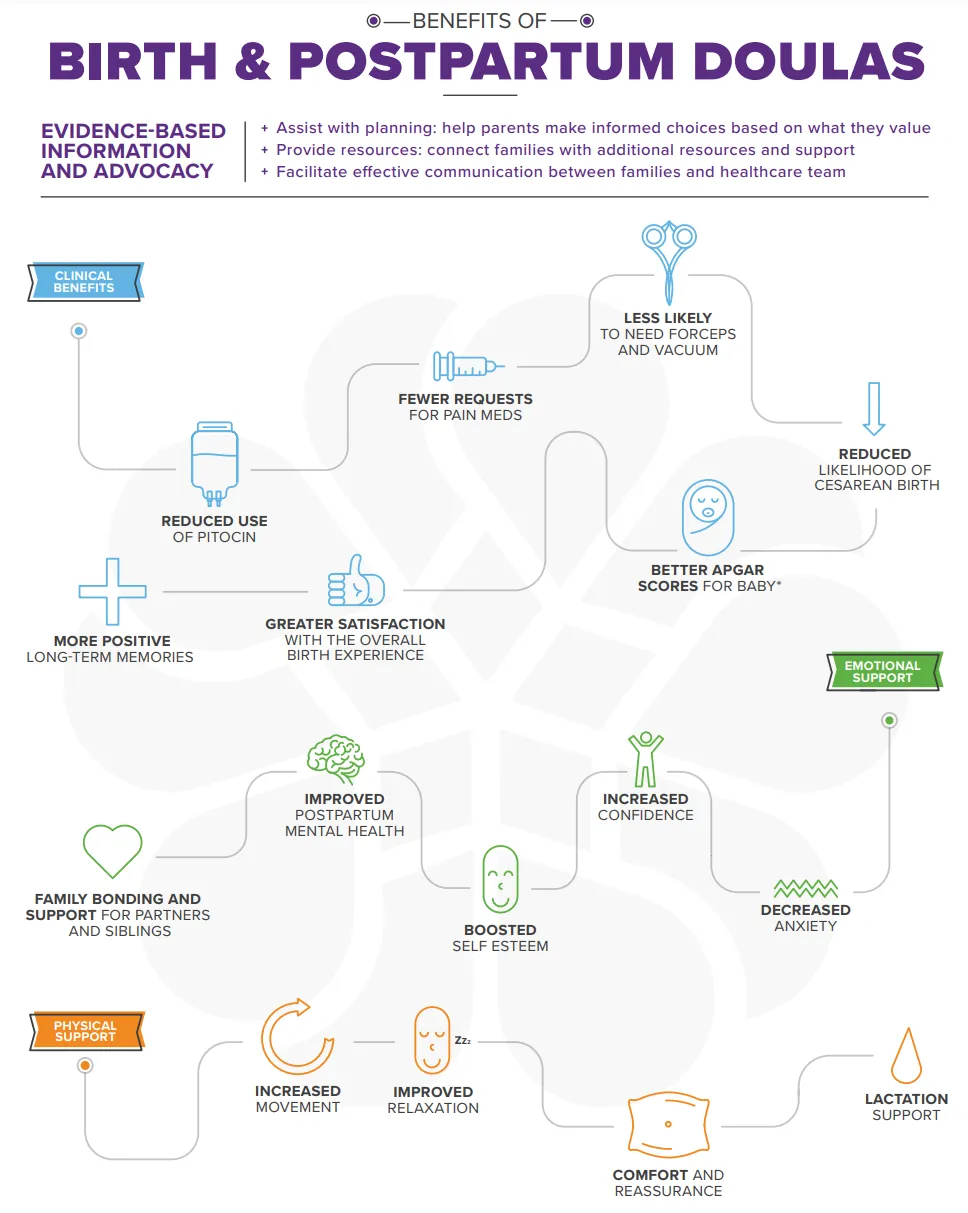Why Postpartum Doula Care?
Postpartum doulas provide families information and support on infant feeding, emotional and physical recovery from childbirth, infant soothing, and coping skills for new parents, including:
- Emotional Support: Postpartum doulas provide a listening ear and emotional support to help you navigate the emotional challenges that can arise during the postpartum period. They are there to offer reassurance, encouragement, and a non-judgmental space to discuss your feelings and concerns.
- Baby Care: Doulas are knowledgeable about newborn care and can assist with tasks such as diapering, feeding (including breastfeeding or bottle-feeding support), burping, and soothing techniques. They can also provide guidance on infant sleep and help establish routines.
- Postpartum Recovery: Postpartum doulas can offer advice and support to aid in your physical recovery from childbirth. They can provide information on postpartum nutrition, healing after birth, and offer comfort measures.
- Breastfeeding Support: If you're breastfeeding, postpartum doulas can provide guidance on proper latch, positioning, and troubleshooting common breastfeeding challenges. They can offer emotional support during this important bonding and feeding process.
- Education: Postpartum doulas often provide evidence-based information and resources on topics such as infant care, postpartum recovery, and baby development. They can answer your questions and address any concerns you may have.
- Rest and Self-Care: One of the most valuable roles of a postpartum doula is to ensure that you, as a parent, get much-needed rest and self-care time. They can watch over the baby while you take a nap, shower, or engage in self-care activities.
- Community Referrals: Doulas can connect you with community resources, support groups, and healthcare professionals if needed. They often have a network of contacts to help you access additional assistance.
It's important to communicate your specific needs and preferences with your postpartum doula. Each doula's services may vary slightly, so discussing your expectations during an initial consultation can help ensure that you receive the support that best suits your family's needs during the postpartum period.

The Doula and the Partner Work Together
The woman's partner (the baby's father or another loved one) is essential in providing support for the woman. A doula cannot make some of the unique contributions that the partner makes, such as a long-term commitment, intimate knowledge of the woman and love for her and her child. The doula is there in addition to, not instead of, the partner. Ideally, the doula and the partner make the perfect support team for the woman, complementing each other's strengths.
In the 1960s, the earliest days of fathers' involvement in childbirth, the expectation was that they would be intimately involved as advisors, coaches and decision-makers for women. This turned out to be an unrealistic expectation for most men because they had litt e prior knowledge of birth or medical procedures and little confidence or desire to ask questions of medical staff. In addition, some men felt helpless and distressed over the women's pain and were not able to provide the constant reassurance and nurturing that women needed.
With a doula present, the pressure on the partner is decreased and he or she can participate at his or her own comfort level. Partners often feel relieved when they can rely on a doula for help; they enjoy the experience more. For those partners who want to play an active support role, the doula assists and guides them in effective ways to help their loved ones in labor. Partners other than fathers (lovers, friends, family members) also appreciate the doula's support, reassurance and assistance.
Doulas as Members of the Maternity Care Team
Each person involved in the care of the laboring woman contributes to her emotional well-being. However, doctors, nurses and midwives are primarily responsible for the health and well-being of the mother and baby. Medical care providers must assess the condition of the mother and fetus, diagnose and treat complications if they arise, and focus on a safe delivery of the baby. These priorities rightly take precedence over the non-- medical psychosocial needs of laboring women. The doula helps ensure that these non-medical needs are met while enhancing communication and understanding between the woman or couple and the staff. Many doctors, midwives and nurses appreciate the extra attention given to their patients and the greater satisfaction expressed by women who were assisted by a doula.
.webp)
.webp)
.webp)
.webp)
.webp)

.webp)
.webp)
